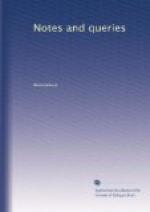The motto of the Somersetshire Bacons, noticed by NOCAB, when read as written, is supposed to be in the ablative case; when transposed, the evident ellipse may be supplied ad libitum. From Grimbaldus, downwards, it does not appear that these beechen men ever signalized themselves by deeds of arms, the favourite boast of heralds and genealogists. Nor indeed could we expect them to have “hearts of oak.” But several have rendered the name illustrious by their contributions to literature, science, and the fine arts. Its appropriateness, therefore, must be apology for the motto; which, like most others, is by no means too modest and unassuming.
Duly blushing, I subscribe myself, yours,
PROBA CONSCIENTIA.
P.S. The pedigree of the Norfolk Bacons is one of the most perfect in the Herald’s College. Any of your readers fond of genealogy might find himself repaid in seeking further information regarding the particular coat of arms above referred to, and might throw still more light on the subject.
In Vol. ii., p. 247., your correspondent, NOCAB, quotes (without reference) the remark en passant of a previous correspondent “that the word bacon had the obsolete signification of ‘dried wood.’” I have searched in vain for this allusion in your preceding Numbers.[2] The information is too curious, however, to be lost sight of. The Saxon word bacon is, without doubt, simply and purely beechen—pertaining to, or relating to the beech tree.
It is probable enough, therefore, that the word has borne the signification of “dried wood.” But it is very desirable to know on what authority the assertion rests. Will your correspondent refer us to the book? Or can any of your learned readers say how, where, and when bacon has signified “dried wood?”
The subject is well worth the bestowal of some pains upon its elucidation; for the meaning and derivation of the word bacon, both as a substantive noun and as a proper name, have been frequently discussed by etymologists and philologists for the last 300 years; and yet, apparently, without any satisfactory determination of the question. The family is ancient, and has been highly distinguished {42} in literature, and science and art. The pedigree is one of the most perfect on record. But Lord Bacon himself, “who knew everything” else, knew nothing of his own name.
[Footnote 2: See vol. ii., p. 138.]
SAMOHT NEHCEEB.
Meaning of Bacon (Vol. ii., pp. 138. 247.).—As, on reconsideration, I perceive there is some doubt as to the meaning of the word bacons in Foulques Fitzwarin, I send you the passage in which it occurs, that your readers may form their own opinion concerning it:—
“Pus apres, furent les
portes de le chastel, qe treblees erent, ars e
espris par feu que fust illumee
de bacons e de grece.”




